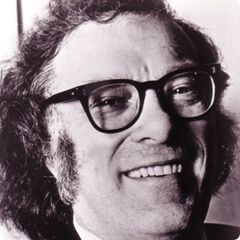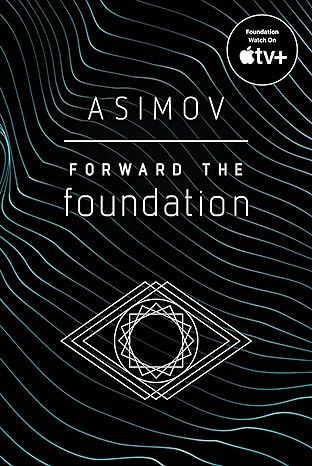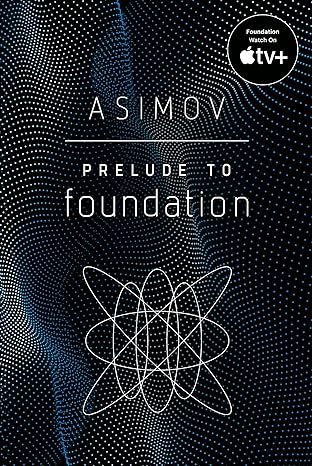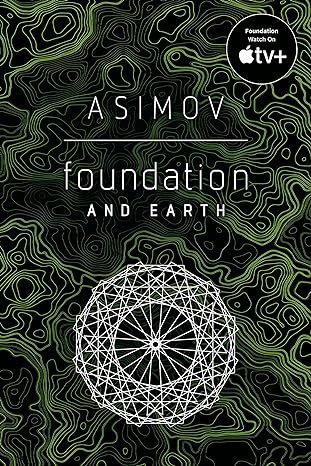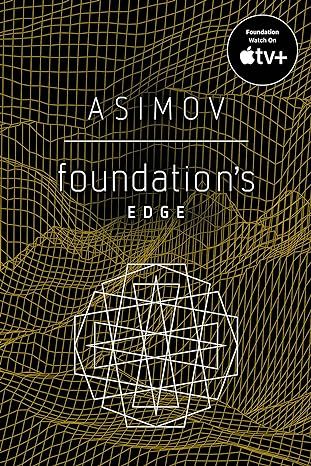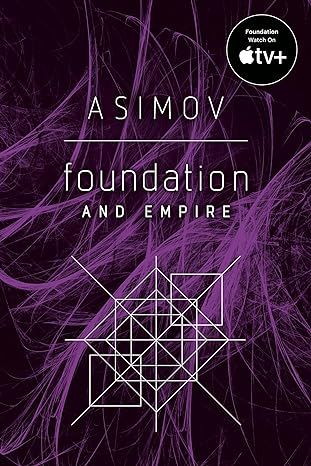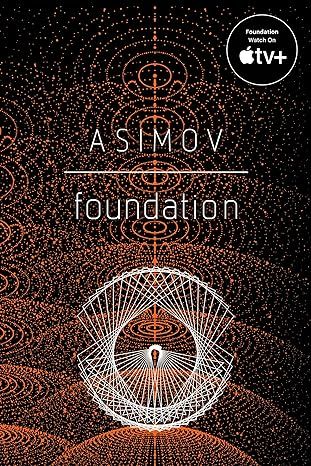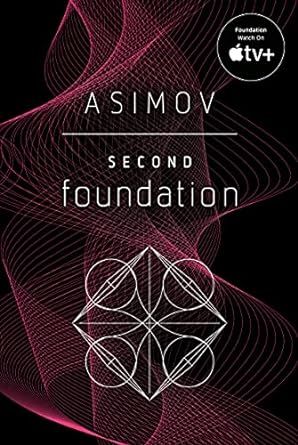
Second Foundation
4.6 out of 5
10,504 global ratings
The third novel in Isaac Asimov’s classic science-fiction masterpiece, the Foundation series
THE EPIC SAGA THAT INSPIRED THE APPLE TV+ SERIES FOUNDATION
The Foundation lies in ruins—destroyed by a mutant mind bent on humanity’s annihilation. But it’s rumored that there’s a Second Foundation hidden somewhere at the end of the Galaxy, established as insurance to preserve the knowledge of mankind. Now a desperate race has begun between the survivors of the First Foundation and an alien entity to find this last flicker of humanity’s shining past—and future hope. Yet the key to it all might be a fourteen-year-old girl burdened with a terrible secret. Is she the Foundation’s savior—or its deadliest enemy?
Unforgettable, thought-provoking, and riveting, Second Foundation is a stunning novel of adventure and ideas writ huge across the Galaxy—a powerful tale of humankind’s struggle to preserve the fragile light of wisdom against the threat of its own dark barbarism.
About the authors
Isaac Asimov
Isaac Asimov was an American author and professor of biochemistry at Boston University, best known for his works of science fiction and for his popular science books. Asimov was prolific and wrote or edited more than 500 books and an estimated 90,000 letters and postcards. His books have been published in 9 of the 10 major categories of the Dewey Decimal Classification.
Asimov wrote hard science fiction and, along with Robert A. Heinlein and Arthur C. Clarke, he was considered one of the "Big Three" science fiction writers during his lifetime. Asimov's most famous work is the Foundation Series; his other major series are the Galactic Empire series and the Robot series. The Galactic Empire novels are explicitly set in earlier history of the same fictional universe as the Foundation series. Later, beginning with Foundation's Edge, he linked this distant future to the Robot and Spacer stories, creating a unified "future history" for his stories much like those pioneered by Robert A. Heinlein and previously produced by Cordwainer Smith and Poul Anderson. He wrote hundreds of short stories, including the social science fiction "Nightfall", which in 1964 was voted by the Science Fiction Writers of America the best short science fiction story of all time. Asimov wrote the Lucky Starr series of juvenile science-fiction novels using the pen name Paul French.
Read more
Reviews
Andrew
5
it’s Asimov
Reviewed in the United States on March 24, 2024
Verified Purchase
It’s Isaac Asimov. His works are not in trial. Time has given him 5 stars. Arguably his best parts are when he explains how it all ties together.
Jes_074
5
The story continues even more
Reviewed in the United States on July 19, 2023
Verified Purchase
I've read the other books in the 'Foundation' series and have enjoyed them thoroughly. I'm not surprised that I enjoyed this one. The whole series flows as if they were one book that had been cut up into three parts. Here we see more of the 'Second Foundation' and how they're still working at fixing the 'Seldon' plan that was damaged in 'Foundation and Empire'. We see how one person in the right moment of time can impact everyone's life in the Galaxy. We also see where people think they're in control, they're really not. We also learn that the 'Second Foundation' is WAY smarter than the 'First Foundation'. Again however this story doesn't end with the recreation of the 'Empire'. This book also ends the 'Foundation Series'. I will not go on at this time to read the extended series because I don't want it to turn out like the 'Dune Series' which just goes on and on and on. This is a great read and once again proves what Isaac Asimov has made clear throughout all his books: those that try to control everything will fail along with those that will do the same with time. People have to be given freedom to choose their own paths in life. The unexpected can throw off all plans and controls. It can also move everything in a new direction that is better than the control. I recommend this book to anyone who says otherwise.
Read more

Adam L. Kopcinski
5
Brilliant cap to a fantastic trilogy
Reviewed in the United States on March 11, 2009
Verified Purchase
The third book is, for my money, the best of the trilogy. If not, it definitely competes with the original for supremacy. That being said, once must note that there is only merely the hint of superiority between novels of the series - each book is engaging and interesting in its own right. But this is where it all comes together folks. Sure, part one feels a little anti-climactic, but part two is wrenching and touches lightly on some philosophical issues, much as the first book dealt with religion and economics. Ideas about destiny and control are explored, and not in a scholastic or bombastic way, but rather, integrate into the plot seamlessly. We finally get our hands on the Second Foundation in this one, and their purpose it not at all what you'd expect, their location, not at all where you might have guessed. Is it all just a little, very slightly, minimally dystopian? Well, yes and no; for people are controlled, but in Asimov's world, not by the technology, or the state, but by intelligence itself. The only Gripe I have with Asimov is his somewhat-sometimes archaic use of language. Why use a word like Valise when something like luggage or suitcase would suffice? Perhaps certain words were in vogue when he wrote his books, or perhaps he was just trying to instill a certain "timeless" quality? At any rate, only a minor quibble. The whole series is excellent and should be read by anyone who seeks entertainment and that certain "wow" factor synonymous with good fiction - science or otherwise.
Read more
aannbrr
5
Still an exciting book after 80 years
Reviewed in the United States on July 31, 2021
Verified Purchase
I first read the Foundation series in the late 60s, a teenager steeped in the society of the day. As a girl, I've always felt the lack of female characters in most of the science fiction available, and Asimov, a male writer, was no different. Through the 3 books of the initial series, there are two female protagonists and I have always cherished their presence. 14 year old Arcady Darrel of Second Foundation has always been my favorite, since I was 16 or 17 when I first read her. Another cultural difference between the 1940s and 2021 is the overwhelming presence of smoking! All these male characters smoked cigarettes or cigars or pipes as they had their exclusively masculine meetings and the occasional male expressed disapproval of a woman's putting herself forward. See, this stuff didn't bother me when I read these books originally, or for the next 30 years. Society changed enough, and my not rereading them for a number of years, conspired together to cause some internal cringing as I read certain passages. However! I still found the story just as compelling as I did the first and fifth and tenth time I read it! Some people have complained that it's all talking, and so a vast amount of it is, but compelling, none the less! A TV series is in development or production at this time. I honestly can't imagine how they can take these books, each one a series of events 50 or 80 or 150 or 325 years apart and create an intriguing show. I look forward with interest to see if they accomplish it.
Read more
8 people found this helpful
Chris Neville
4
Science Fiction Linguist
Reviewed in the United States on September 19, 2023
Verified Purchase
It is really amazing the vocabulary of Asimov that has flowed to many science fiction stories. The Foundation novels started the creativity of The Star Wars and Star Trek series. The Second Foundation starts with defeat and then victory and then leaves you wondering what the conclusion really is. You become confused on which Foundation to believe and root for, and that makes it all the more enjoyable. It plays with your emotions. I have enjoyed the entire series.
Read more
Top Isaac Asimov titles
Best Sellers

The Great Alone: A Novel
4.6
-
152,447
$5.49

The Four Winds
4.6
-
156,242
$9.99

Winter Garden
4.6
-
72,838
$7.37

The Nightingale: A Novel
4.7
-
309,637
$8.61

Steve Jobs
4.7
-
24,596
$1.78

Iron Flame (The Empyrean, 2)
4.6
-
164,732
$14.99

A Court of Thorns and Roses Paperback Box Set (5 books) (A Court of Thorns and Roses, 9)
4.8
-
26,559
$37.99

Pretty Girls: A Novel
4.3
-
88,539
$3.67

The Bad Weather Friend
4.1
-
34,750
$12.78

Pucking Around: A Why Choose Hockey Romance (Jacksonville Rays Hockey)
4.3
-
41,599
$14.84

Start with Why: How Great Leaders Inspire Everyone to Take Action
4.6
-
37,152
$9.99

Tomorrow, and Tomorrow, and Tomorrow: A novel
4.4
-
95,875
$13.99
